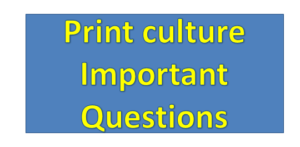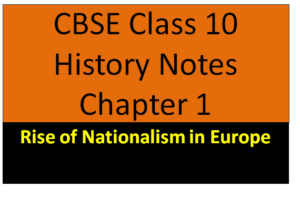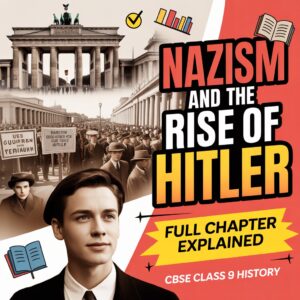
MCQ Questions for Class 10 History Chapter 1. Rise of Nationalism
1. What type of conservative regimes were set up in 1815 in Europe?
(a) Autocratic
(b) Democratic
(c) Aristocratic
(d) Dictatorial
2.Identify the French artist who prepared a series of four prints visualising his dream of a world
from the following:
(a) Kitagewa Utamaro
(b) Richard M Hoe
(c) Voltaire
(d) Frederic Sorrieu
3. ——- Napoleon invaded in 1790s
(a) Italy
(b) france
(c) Austria
(d) Japan
4. Victor Emmanuel II was proclaimed King of united Italy in ——————
(a) 1861
(b) 1871
(c) 1891
(d) 1851
5. Philip Veit painted the image of ————
(a) Germania
(b) statue of liberty
(c) Bharat mata
(d) none of these
6.Three wars over ——— years with Austria, Denmark, Germany and France ended in Prussian
victory
a) 7 b) 8 c) 9 d) 10
7.. Who was proclaimed the ———— of Germany in 1871?
a) king b) Emperor c) Presidentb d) none of these
Q 8.- Who was called the Árchitect of Germany’s Unification?
Napoleon
Ottto Von Bismarck
Mazzini
Garibaldi
Q9. when the Greek struggle for Independence begins?
1821
1797
1850
1800
Q10.- What the crown of oak leaves symbolise?
Peace
Heroism
Courage
Tolerance
Q11- ——— treaty gave Greece a recognition of an independent nation?
Treaty of Vienna
Treaty of Versailles
Treaty of Lausanne
Treaty of Constantinople
Q12- ———— refers to which movement.
Political Movement
Religious Movement
Cultural Movement
Literary Movement
Q13- ——— formed the secret society called ‘Young Italy’.
Metternich
Mazzini
Johann Gottfried Herder
Otto Von Bismarck
Q14- Before the Revolution in France in 1789, ———of the following types of government were
functioning there.
Monarchy
Military
Body of French Citizen
Dictatorship
Q15- Italian Princely house ruled ———– of the following states before the Unification of Italy.
Sardania-piedmont
Lomabardy
Venetia
Kingdom of two Sicilies
16. Match the term with the statements given below:
A ‘Utopian Society’ is
(i) a society under a benevolent monarchy
(ii) a society that is unlikely to ever exist
(iii) a society under the control of a chosen few wise men
(iv) a society under Parliamentary Democracy
(a) (i) and (ii)
(b) (ii) and (iii)
(c) (ii) only
(d) (iii) only
17. Pick out the correct definition to define the term ‘Plebiscite’.
(a) Plebiscite is a direct vote by which only the female members of a region are asked to accept or
reject a proposal.
(b) Plebiscite is a direct vote by the female members of a matriarchal system to accept or reject a
proposal.
(c) Plebiscite is a direct vote by only a chosen few from the total population of a parti-cular region to
accept or reject a proposal.
(d) Plebiscite is a direct vote by which all the citizens of a region are asked to accept or reject a
proposal.
18. Ernst Renan believed that the existence of nations is a necessity because
(a) it ensures protection to all inhabitants.
(b) it ensures liberty to all inhabitant citizens.
(c) it ensures Parliamentary form of govern-ment to its inhabitants.
(d) it ensures jobs and good health to all its inhabitants.
19. ———-of the following countries did not attend the Congress of Vienna?
(a) Britain
(b) Russia
(c) Prussia
(d) Switzerland
20. ———– great revolution which gave the clear idea of nationalism with its core words: ‘Liberty,
Equality and Fraternity’ was:
(a) The Russian Revolution
(b) The French Revolution
(c) The American Revolution
(d) India’s First War of Independence
21. ———– of the following statements about the ‘French Revolution’ are correct?
(i) After the end of the French Revolution it was proclaimed that it was the people who would
henceforth constitute the nation and shape its destiny.
(ii) France will have a constitutional monarchy and the new republic will be headed by a member of
the royal family.
(iii) A centralised administrative system will be put in place to formulate uniform laws for all
citizens.
(iv) Imposition of internal custom duties and dues will continue to exist in France.
(a) (ii) and (iii)
(b) (ii) and (iv)
(c) (i) and (iii)
(d) (iii) and (iv)
22. The Civil Code of 1804 in France is usually known as:
(a) The French Revolutionary Code
(b) Napoleonic Code
(c) European Imperial Code
(d) The French Civil Code
23. The Napoleonic Code was exported to which of the following regions?
(a) England
(b) Spain
(c) Regions under French control
(d) Poland
24. The liberal nationalism stands for:
(a) freedom for the individual and equality before law.
(b) preservation of autocracy and clerical privileges.
(c) freedom for only male members of society and equality before law.
(d) freedom only for senior citizens.
25. ———– among the following formed the secret society called ‘Young Italy’? [Delhi 2012]
(a) Otto von Bismarck
(b) Giuseppe Mazzini
(c) Mettemich
(d) Johann Gottfried Herder
26. ———— ‘Universal Suffrage’ means:
(a) the right to vote and get elected, granted only to men.
(b) the right to vote for all adults.
(c) the right to vote and get elected, granted exclusively to property owning men.
(d) the right to vote and get elected, granted only to educated men and women.
27. ————— of the following is not a feature or belief of ‘Conservatism’?
(a) Conservatives believe in established, traditional institutions of state and policy.
(b) Conservatives stressed the importance of tradition and preferred gradual develop¬ment to quick
change.
(c) Conservatives proposed to return to the society of pre-revolutionary days and were against the
ideas of modernisation to strengthen monarchy.
(d) Conservatives believed in the monarchy, church, and other social hierarchies.
28. The Treaty of recognized Greece
as an independent nation:
(a) Vienna 1815
(b) Constantinople 1832
(c) Warsaw 1814
(d) Leipzig 1813
29. ————– said ‘When France sneezes, the rest of Europe catches cold’?
(a) Garibaldi
(b) Bismarck
(c) Mazzini
(d) Duke Metternich
30. ————- happened to Poland at the end of 18th century. Which of the following answers is
correct?
(a) Poland achieved independence at the end of the 18th century.
(b) Poland came totally under the control of Russia and became part of Russia.
(c) Poland became the part of East Germany.
(d) Poland was partitioned at the end of the 18th century by three Great Powers: Russia, Prussia
and Austria.
31. ———– played the leading role in the unification of Germany?
(a) German Emperor (formerly King of Prussia) — Kaiser William I.
(b) Otto Von Bismarck (Prussian Chief Minister).
(c) Johann Gottfried Herder — German philosopher.
(d) Austrian Chancellor — Duke Metternich.
32. Three wars over seven years with Austria, Denmark, Germany and France, ended in
(a) Danish victory
(b) Prussian victory
(c) French victory
(d) German victory
33. ———- was proclaimed the emperor of Germany in 1871?
(a) Otto Von Bismarck
(b) Victor Emmanuel II
(c) Count Cavour
(d) Kaiser William I of Prussia
34. ———- became the King of United Italy in 1861?
(a) Giuseppe Garibaldi
(b) Victor Emmanuel II
(c) Count Cavour
(d) Giuseppe Mazzini
35. ——— helped in the formation of a nation-state in Britain?
(a) The formation of a nation-state in Britain was the result of a sudden upheaval.
(b) In 1688, the monarchy in Britain had seized the power from English Parliament.
(c) The parliament through a bloodless revolution seized power from the monarchy which gradually
led to the emergence of a nation-state.
(d) The British nation was formed as a result of a war with Scotland and Wales.
36. ———– was responsible for the unification of Germany?
(a) Count Cavour
(b) Bismarck
(c) Garibaldi
(d) Giuseppe Mazzini
37. The allegory of the German nation who wears a crown of oak leaves was a:
(a) Marianne
(b) Union Jack
(c) Britannia
(d) Germania
38. A large part of Balkan region was under the control of:
(a) Russian empire
(b) Ottoman empire
(c) German empire
(d) Habsburg rulers
39. ———- country broke away from the ‘United Kingdom of the Netherlands’ after July
Revolution of 1830?
(a) Belgium
(b) Greece
(c) Ireland
(d) Scotland
40. Mention two attribute of liberty
41. ——– the event tat mobilised nationalist feelings among the educated elite across Europe in
1830-1848?
True or false
42. After the defeat of Nepoleon in 1820, European government were driven by a spirit of
conservative. –
43. The fruit upheaval took place in France in July 1830. –
44. The treaty of constantinople of 1832 did not recognize Greece as an independent nation. –
45. The Habsburg rulers granted more autonomy to the Hungarians in 1867-
46. After 1850 Nationalism in Europe moved away from its association with democracy and
revolution –
47. In January 871 the Prussian king, William I was proclaimed German emperor in a Germany
held at Versallies. –
48. Italy like Germany also had a long history of political fragmentation.-
49. Fredric Sorrieu prepared a series of four prints visualizing his dream of a world made up of
democratic and social Republics.-
50. Plebiscite means an indirect vote by which people of a region as asked to accept or reject a
proposal.






